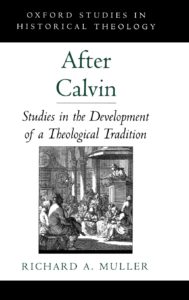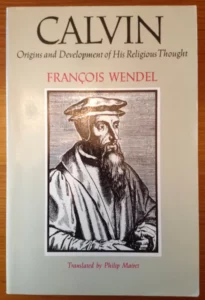 One of the problems with the “Calvin against Calvinists” scholarship is that it is based on questionable theological premises. This includes the claim that there is conflict between the predominantly scriptural and Christocentric theology of Calvin and the theology of later Calvinists or Reformed Scholasticism whose application of Aristotelian philosophy and speculative formulation of the will of God resulted in a doctrine of God which is rationalistic and predestinarian.
One of the problems with the “Calvin against Calvinists” scholarship is that it is based on questionable theological premises. This includes the claim that there is conflict between the predominantly scriptural and Christocentric theology of Calvin and the theology of later Calvinists or Reformed Scholasticism whose application of Aristotelian philosophy and speculative formulation of the will of God resulted in a doctrine of God which is rationalistic and predestinarian.
However, while the orientations of the two theological approaches are different, they are not mutually exclusive. Neither are they homogeneous systems. Indeed, the intellectual currents of the Reformation era were diverse and complex. Recent scholarship exemplified by the eminent historian Heiko Oberman has brought into question the now superseded view that Reformation thought is sharply discontinuous with medieval scholasticism. A balance reading of the historical sources would give due recognition to the issues of continuity and discontinuity in development of Reformation thought. Without doubt, a new appraisal of the questionable premises of the “Calvin against Calvinists” scholarship is in order.
I shall highlight only several of Richard Muller’s proposals on how the premises of scholarship on the relationship between Reformation thought and Protestant Scholasticism should be modified. Muller is arguably the doyen of scholarship on the history of post-reformation reformed theology.
1. “Scholasticism” and “Aristotelianism” must not be understood as static or as purely medieval phenomena, as if neither underwent a historical development that extended through the sixteenth into the seventeenth century.
2. Scholasticism and rationalism must also be clearly distinguished – on historical, philosophical, and theological grounds.
3. Method and content need to be distinguished, albeit not utterly separated. [It is now widely recognized that “scholasticism” refers primarily to a method of organizing theology for teaching in the academia rather than to the substance of theology or doctrines. The Reformed theologians adopted medieval scholastic methods for systematizing theology, but they retained the fundamental doctrinal content of the Reformation].
4. Continuities and discontinuities in the interpretive or exegetical tradition must be given at least equal weight with developments in scholastic method and philosophical usage.
5. Individual Reformation thinkers or treatises ought not to be made a measure either of the whole Reformation era or of the Reformed character of individual orthodox era thinkers or treatises. [This modified premise brings into question the older notion that Calvin was the principal, if not, sole founder of Reformed theology that emerged after him. However, Calvin was but one among several significant figures of Reformed theology. It would be more appropriate to speak of a Reformed movement rather than Calvinism per se].
6. The various forms of the “central dogma” theory, both those that indicate a continuity between Calvin and Reformed orthodoxy and those that indicate a disjunction, must be set aside. [In particular, the “Calvin against Calvinists” scholarship which pits the biblical predestination of Calvin against the dogmatic and rationalistic predestination of later Calvinists must be set aside].
 The idea that predestination is a central doctrine of Calvin’s theology is contradicted by how Calvin deals with predestination in his Institutes. Francois Wendel notes that the earlier writings of Calvin do not contain any systematic statement on the issue of double predestination. Undoubtedly, Calvin gives growing importance to predestination, but “he did so under the sway of ecclesiological and pastoral preoccupations rather than in order to make it a main foundation of his theology. While he never ceases, in discussions of the most various questions, to repeat the great themes of the freedom of God and his glory and of the divinity of Christ, he only very rarely speaks of predestination except in the four chapters that are devoted to it in the edition of 1559. As Wernle has said, ‘it cannot be over-emphasized: faith in predestination is a long way from being the centre of Calvinism; much rather is it the last consequence of faith in the grace of Christ in the presence of the enigmas of experience.’ In the Institutes of 1536, predestination did not yet appear as an independent doctrine. Calvin mentioned it only in two places; in the explanation of the second article of the Creed, and in regard to the definition of the Church.” [Wendel, 264-265] Wendel adds, “For Calvin, The point of departure, as in the Institutes, is the fact that the preaching of the word does not equally move all those that hear it, but bears its fruits only in the elect, whereas to the reprobate it brings only death. The practical and ecclesiological point of view is evident and clear, as it is also in St Augustine and in Bucer.” [Wendel, 266]
The idea that predestination is a central doctrine of Calvin’s theology is contradicted by how Calvin deals with predestination in his Institutes. Francois Wendel notes that the earlier writings of Calvin do not contain any systematic statement on the issue of double predestination. Undoubtedly, Calvin gives growing importance to predestination, but “he did so under the sway of ecclesiological and pastoral preoccupations rather than in order to make it a main foundation of his theology. While he never ceases, in discussions of the most various questions, to repeat the great themes of the freedom of God and his glory and of the divinity of Christ, he only very rarely speaks of predestination except in the four chapters that are devoted to it in the edition of 1559. As Wernle has said, ‘it cannot be over-emphasized: faith in predestination is a long way from being the centre of Calvinism; much rather is it the last consequence of faith in the grace of Christ in the presence of the enigmas of experience.’ In the Institutes of 1536, predestination did not yet appear as an independent doctrine. Calvin mentioned it only in two places; in the explanation of the second article of the Creed, and in regard to the definition of the Church.” [Wendel, 264-265] Wendel adds, “For Calvin, The point of departure, as in the Institutes, is the fact that the preaching of the word does not equally move all those that hear it, but bears its fruits only in the elect, whereas to the reprobate it brings only death. The practical and ecclesiological point of view is evident and clear, as it is also in St Augustine and in Bucer.” [Wendel, 266]
The fact that Calvin was undecided where to place predestination in the Institutes belies the claim that predestination is a central doctrine of Calvin’s theology. In his 1539 edition of the Institutes, Calvin placed predestination along with providence after the work of salvation. But Calvin revised the order of the doctrine in his 1559 edition of the Institutes where he places providence at the end of the doctrine of God, and predestination after the developments upon sanctification and justification. Wendel explains, “Just as the doctrine of providence, placed at the conclusion of the doctrine of God, might be said to complete the latter as the keystone finishes an arch, so also does the doctrine of predestination complete and illuminate the whole of the account of the Redemption. The link between predestination and providence subsists, then, in the last edition of the Institutes, in their two parallel functions.” [Wendel, 268]. In short, Calvin’s predestination was basically soteriological rather than speculative.
Those who are tempted to ground Calvin’s theology on predestination would do well to heed his counsel, “we must also avoid the contrary excess of wishing to enter into the secrets of God, which would anyhow be impossible for us. It would also be an act of impiety, for we should be presuming to do without the means that God puts at our disposal to assure ourselves of our salvation. ‘The election of God is hidden and secret in itself, but the Lord manifests it by the calling; that is, when he does this good to us by calling us. Wherefore men are being fantastic or fanatical if they look for their salvation or for the salvation of others in the labyrinth of predestination instead of keeping to the way of faith which is offered them…To each one, his faith is a sufficient witness of the eternal predestination of God, so that it would be a horrible sacrilege to seek higher assurance; for whoever makes difficulties about subscribing to the simple testimony of the Holy Spirit does him great dishonour’ (Com. on John 6:40). Under these conditions, one must draw the line between speculations arising from an impious curiosity and legitimate knowledge of the doctrine of predestination. The limit between these two domains is indicated by the Scriptures, which give us knowledge of what is useful and salutary for us. So Calvin, for his own explanations, intends to keep to the data of revelation alone. ‘Let us, then, keep this in view above all other things, that it is no less insane to crave for other knowledge of predestination besides that which is given us in the word of God, than if one wanted to walk over inaccessible rocks or to see in darkness’ (Inst. 3.21.2).” [Wendel, 270-271]
Wendel emphasizes that for Calvin, predestination “was never to be discussed as an indulgence in metaphysical speculations, but to throw a fuller light upon the doctrine of justification by grace alone and give a theological basis for ecclesiology.” [Wendel, 269]. The various placements of predestination in the Institutes confirms that it is not a central doctrine of Calvin’s theology.
It should be noted that the format of the writings of Reformed Scholasticism is based on various loci communes (common theological premises), that is, the collection of basic topics arranged into an ordered body of doctrines to be debated. However, since the fundamental principle of the Reformation was the Bible as a source of saving truth, it was natural for Reformed theologians to regard the loci communes to be nothing else than the Scriptures themselves. Hence, the theological discussions were based on scriptural premises rather than abstract philosophical principles. As such, the loci communes, including predestination, were not conducive towards functioning as central or controlling doctrines of theology systems. The absence of a central and controlling doctrine both in Calvin and in later Calvinists theologians suggests that there is no adequate criterion to judge later Calvinist or Reformed theology to be a distortion of Calvin’s theology. We can only conclude that in the light of the problematic methodological premises, the simplistic assertion of “Calvin against Calvinists” scholarship will have to be set aside. Indeed, Muller in his book, Christ and the Decree (Eerdmans, 1986, 2008) confirms that the Reformed theologians who succeeded Calvin, such as Beza, Ursinus, Zanchi, Polanus and Perkins remained true to the essentials of Calvin’s theology.
Sources
Richard Muller, After Calvin: Studies in the Development of a Theological Tradition (Oxford UP, 2003).
Francois Wendel, Calvin: Origins and Development of His Religious Thought (Harper & Row, 1963).
Related Post
Calvin and Calvinists on the Extent of Christ’s Atonement